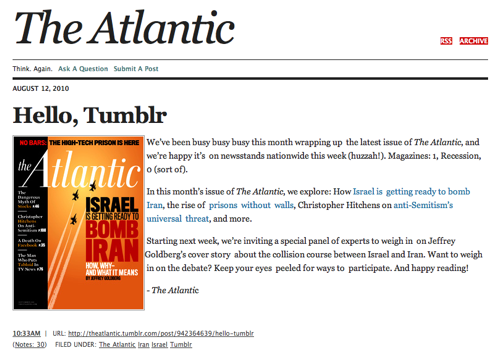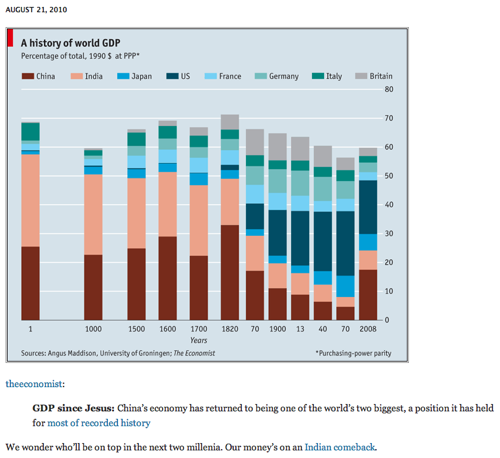 Until recently, Tumblr was a fairly isolated phenomenon: a platform that (to overgeneralize only slightly) helped a slew of web-savvy young city-dwellers to stay connected with more characters than Twitter but less commitment than blogs. Now, though, the service — which passed its billion-post mark last Monday — is in the air in a more diffuse way, via the tons-of-Tumblrs popping up under the banners of national news outlets. There’s Newsweek’s praiseworthy specimen — the most buzzed-about of the bunch — but there’s also The New Yorker’s, The Economist’s, The American Prospect’s, Life magazine’s, the Huffington Post’s, the Paris Review’s, Utne Reader’s, ProPublica’s, and, a bit farther afield, Public Radio International’s, ABC News Radio’s…and on and on.
Until recently, Tumblr was a fairly isolated phenomenon: a platform that (to overgeneralize only slightly) helped a slew of web-savvy young city-dwellers to stay connected with more characters than Twitter but less commitment than blogs. Now, though, the service — which passed its billion-post mark last Monday — is in the air in a more diffuse way, via the tons-of-Tumblrs popping up under the banners of national news outlets. There’s Newsweek’s praiseworthy specimen — the most buzzed-about of the bunch — but there’s also The New Yorker’s, The Economist’s, The American Prospect’s, Life magazine’s, the Huffington Post’s, the Paris Review’s, Utne Reader’s, ProPublica’s, and, a bit farther afield, Public Radio International’s, ABC News Radio’s…and on and on.
One of the most recent additions to the world of media-outlet-Tumbling comes courtesy of The Atlantic, which marked its entry into that world earlier this month. With this:

Since then, the outlet’s fledgling Tumblog has been populated with ephemera both serious and less so: a mix of images and blurbs and links to content from around the web, from TheAtlantic.com to far, far beyond. Today, for example, finds images of Macchu Picchu and New Orleans; last week found, among other posts, a link to AtlanticTech’s story about competitive lock-picking; an image of real-world renderings of keyboard shortcuts; a post pointing us to the photo site 2 4 Flinching and its compendium of photographs “detailing life on and in the New York City subway in the 1980’s”; a link to an Atlantic photo essay documenting the decay that remains in New Orleans five years after Katrina; a link to Karim Sadjadpour’s list of five key points about the wisdom of an Iranian military strike that, had he the chance, he’d convey to Benjamin Netanyahu; and a YouTube video, via Newsweek’s Tumblr, of “Denver mayor John Hickenlooper, the Democratic nominee for gov, who somehow manages to spend 30 seconds of film time in the shower without being sensual or pathetic.”
In other words, The Atlantic’s Tumblr, like its media-led peers, reads a bit like the world itself: messy and arbitrary and yet, somehow, sensical. There’s an internal logic to it — but one based on the core illogic of, simply, “what’s interesting.” There’s a good amount of madness…with very little method in it.
And that’s the point.
“If our approach is anything, it’s just experimental,” says J.J. Gould, TheAtlantic.com‘s deputy online editor, who’s helping to think through the outlet’s Tumblr presence. The goal is to interact with the quirky new platform — to get to know its rules and rhythm and tones — and go from there. Sure, “we should be smart in the way we approach Tumblr as we aspire to be smart in the way we approach anything,” he says. “But it’s not something that needs to be over-thought.”

So will The Atlantic’s Tumblr end up looking like The Economist’s (a slick affair filled with crisp images and content curated mostly from the magazine’s own website)? Or will it be more like Newsweek’s (which, even after the departure of former-proprietor Mark Coatney, remains witty and snarky and, in feeling if not in branding, separate from its parent outlet)? Or something in between?
Again: TBD.
And, again: that’s okay. In fact, that’s how it should be. The newness — and, as of now, the relative unknown-ness — of Tumblr offers a certain freedom for media outlets concerned, now more than ever, with the demands of their brands. “One of the things we’re interested in is just the question of what a media institution with a 153-year-old history might be able to do with Tumblr that it can’t do with other things,” Gould says. Tumblr, he notes, is “to some extent a different medium — it plays differently. That’s what’s awesome about it.” Newsweek’s Coatney-led account, the (yeah, I’m going to say it) trailblazing Tumblr, established the freewheeling-because-separate (and separate-because-freewheeling) relationship between the Tumblog and its parent outlet — and that assumption of separateness is one that other outlets are now benefiting from. Coatney recalled for me the leniency he received from his higher-ups at the then-still-WaPo-owned magazine: “Experiment. Do whatever you want. Don’t embarrass us too much. And see how it goes.”

That’s the attitude that has come to characterize the Tumblr accounts of even The Most Serious News Organizations. “I don’t think the Tumblr is something that one needs to or even should bring too much strategy to,” Gould says. “You should just sort of learn what it is, and learn what works well.” And that process, undertaken with a platform whose very infrastructure encourages caprice, requires a level of lightheartedness. Sure, The Atlantic can use its Tumblr to push Atlantic content — people who are following the magazine on Tumblr, Gould points out, are presumably also interested in the work it produces — but, ultimately, “we’re interested in approaching Tumblr as its own thing.”
The broader interest is one you don’t often hear discussed in the rarefied air of our national magazines-of-ideas, but one that could stand to get a little more traction in that world: in a word, whimsy. “We certainly think it looks like a lot of fun,” Gould says of his magazine’s new platform. Tumblr’s family status — both of the brand, but independent of it — makes it an ideal platform for, among other things, finding out where that fun fits into the new world we’re forging. Tumblr’s rapid growth, Gould notes, “says something to us. It’s speaking to people in some way.”
Update: This post originally said that The Atlantic’s Tumblr “doesn’t employ Peter Vidani‘s free — and quite popular — Atlantic theme.” In fact, that’s exactly the theme it uses. Sorry, Peter! (And thanks, J.J., for pointing out the error.)